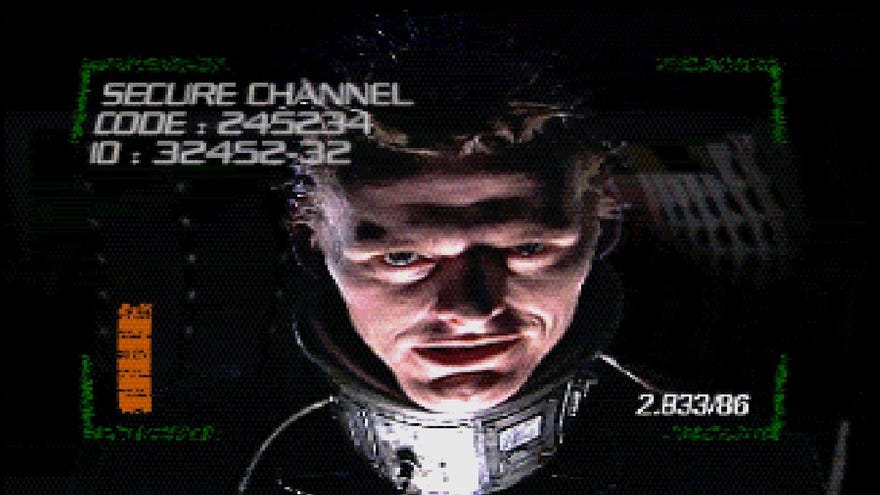The most interesting space trader is still one from 1998
Fly me to the moon moth
Even after a decade marked by the abandonware crowd being proven right, there are old games that remain lost between the cracks of digital distribution. Instead of waxing lyrical about that though, I'm here today with good news: My favourite open world 3D spaceflight/trading sim Hardwar is back.
It's been back for over a year, in fact, via Zoom Platform, who've just made the interesting choice to publish it on Steam too, promising that their own store will remain resolutely DRM-free, and that this aims "to help fund additional signings and improvements for our DRM-Free preservation efforts". I'll brush aside analysing this strategy, because the immediate upshot is that, hopefully, Hardwar might finally get its due. In a better world, we'd already be playing its modern descendants.
I'm not naive enough to think it will suddenly take off. Hardwar had its shortcomings even in 1998. But after discovering it in 2006, replaying it in 2012, and loving it again these last few weeks, I think my vague dissatisfaction with the genre today might actually be disappointment that Hardwar is still so singular. It's a bit nostalgia, sure, but not the "what I actually miss is feeling young" variety. It takes me not to the past, but to a promised future long overdue.
So. Humanity reached the stars, built the mining colony of Optimism on Titan, and then promptly abandoned it when it was no longer profitable. Centuries later, Misplaced Optimism is a hellish lost world of inbred, cloned, mercifully drunk and high people under the thumb of two deadlocked gangs. But you're one of the lucky few to own a ship. Or rather, a "moth". All aircraft on Titan are solar-powered hovercraft who must cluster around big glowing lightwells when the power runs low, lest they fall out of the sky. They can't climb beyond the handful of craters and connecting tunnels that comprise the colony. The smaller engines can't even reach some high altitude docks.
It's unclear if anyone even still qualifies as human, and nobody knows what happened to Earth, but everyone's sure that it can't be worse than this
It's unclear if anyone even still qualifies as human, and nobody knows what happened to Earth, but everyone's sure that it can't be worse than this, so when a strange craft drops out of the sky and crashes, it rapidly escalates the local factions to a destructive arms race, offering you the opportunity to make a lot of money and, maybe if you're lucky, a way off Titan.
All this sets up an open world flying game about making money through trading, piracy, bounty hunting, and, my personal favourite, scavenging. Each of Misop's craters is full of buildings, most of which have airlocks you can dock at to buy and sell things. But this isn't just a standard "find the best route and repeat" deal. Almost everything is made from something else. Learning the way the various production chains work is a big part of the experience. Everything must also be carried from place to place by NPC moths, who react dynamically to changes in prices and availability, to each other, and to you. A refinery cut off from ore will raise its offering price, drawing traders from the mines to capitalise. If all the laser turrets are bought up, the next one to come on the market will go for a premium, and you may have to race someone to buy it. The most advanced moths may not appear at all unless you supply a workshop with the parts needed to manufacture it, or the knock-on effects of your behaviour mean that someone else does.
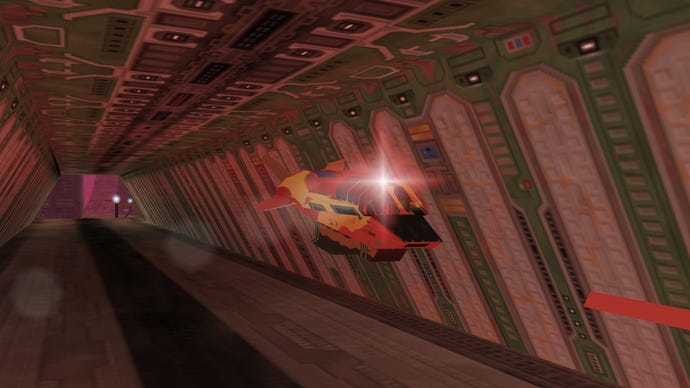
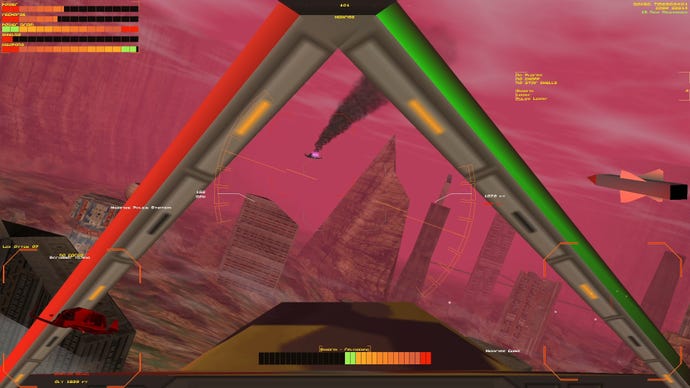
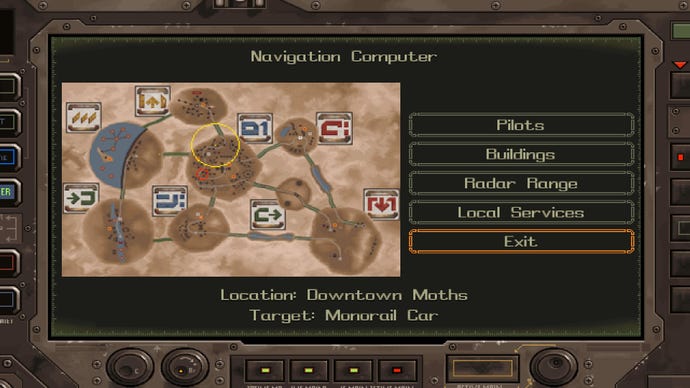
Fans of the X series will recognise a lot of this, as Hardwar is a much smaller ancestor, with a bigger focus on fighting. Everyone can see everyone else's cargo, see, and pirates fly largely unmolested by the corrupt cops, so anything valuable will almost certainly attract trouble. Traders must learn how to fight, and when to dump their cargo. Scavengers should become skilled pilots, masters of grabbing loose cargo and escaping. And everyone should be an opportunist. Someone carrying multiple goods may be worth tailing so you can snatch one of them when a pirate hits them. Factions will pay bounties if you shamelessly finish off the weakened winner of their battles, then settle the score with your new enemy by shooting down that pirate you saw preying on their transports.
It's a world that feels alive. Shoot a moth down, and nearby scavengers will swarm over to pick through the goods. Buy new equipment from a shop and a few minutes later you'll see a trader fulfilling the shop's request to replace what you bought. Half the economy can grind to a halt because too many pirates are hoarding intermediary goods, and if you purge them, the game generates replacement pilots who travel by cab to their new hangars, then fly to a weapons dealer to refit, causing a spike in demand for weapons that traders will rush to fulfill.
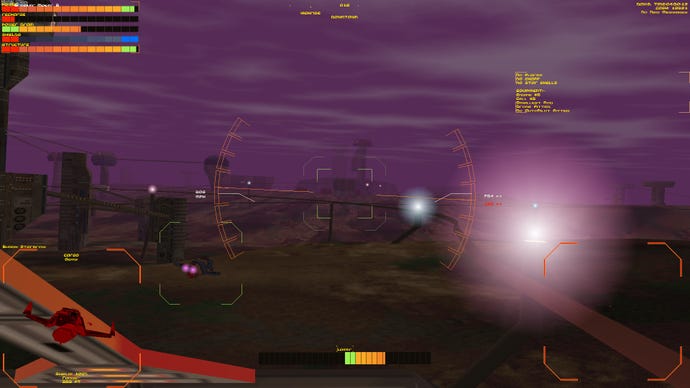
It's an easy system to break. The AI in particular is still robust for decision making, but struggles with avoiding collisions. Playing it now requires a kind of honour system in not exploiting the not-uncommon conditions under which NPC moths become near helpless. It's easy to game a lot of its systems, you'll likely chance into a very powerful combination of weapons pretty early and never need to change them, and the addition of ownable manufacturing facilities (and cloning, making you basically immortal) and plot-unlocked advanced technology turns the difficulty from "opaque and unforgiving" to "farcically one-sided". The controls take some rejigging, and its menus are very cumbersome.
It may be anathema to modern design assumptions, but Hardwar gives you no weapon or moth stats given at all, just extremely brief descriptions of its few options. Consequently, you improve less with hardware than with your own experience. Despite the HUD readouts all over these screenshots, this is an aerial combat game all about eyeballing it. It means a rough start, but leaves room for you to feel things out and experiment, exploring possibilities even after you've learned the most effective ones. I often stick with the lurid Moon Moth, a weak but cheap model, and very maneuverable by moth standards, making it a strong scavenger. So what if it's crap? Everything in Misop is. Examined the economy enough and you'll realise everything is built from scraps. The moths are ungainly, clumsy, beaten up old things made of endlessly recycled junk. Water comes from reclaimed sewage, moths from salvaged wrecks, and even you might become a clone of a clone. It was never pretty, but today it's an ugly place, all angles and blurry terrain and rough hewn shapes.
And it should be. Although nowhere near the kind of ugly beauty of a Kenshi or Northern Journey, Hardwar is murky, but not miserable to play, because it has character. The thick fog turns hardware limitations of the time to its advantage into both kinds of atmosphere, as tall buildings lurch out of the mist, and the skies alternate between vivid peach, orange, and purple hues instead of the traditional boring black of space. Lightning strikes frequently, and the endless humming of your engine reminds you that you live in this ship now. Your life is whipping round to investigate a distant flare, catching up on (repetitive, clunky) messages while resting in a lightwell, non-lethally fending off a rival by hitting him with a battery-draining leach missile, and learning to fear the brutal groundbase missiles for their ability to instantly pull you into the ground. It's a game that works better if you work with it and roleplay a little, filling the spaces between its dashes of style, and those very 90s kind of FMV that's somehow equal parts cyberpunk and cheerful camp, like a less edgy Quarantine. An early plot message has a faction boss addressing the whole colony while casually chilling in his body harness. It takes itself exactly seriously enough for what is a basically okay plot with a great vibe.
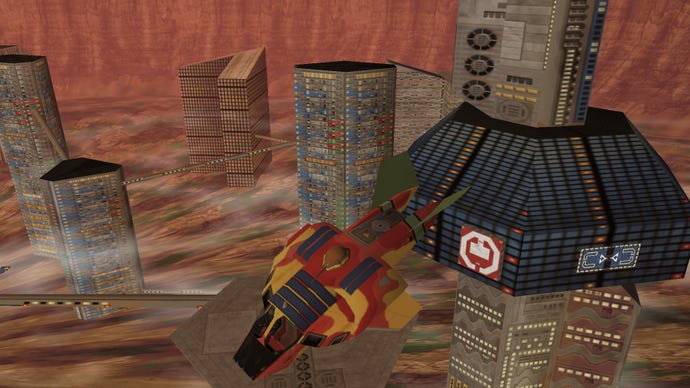
I love Hardwar. I can't say it holds up as timeless, nor recommend it without insisting you go back and read about those flaws again and consider that I really meant them. I recommend it now to anyone who read this far and thought "this sounds wonky and old but kind of neat?". We deserve a modern version, but I don't mean a remake. I mean an inheritor. A direct sequel, maybe, or the same ideas with modern advances in an all new, equally offbeat setting. Or god help me, even an MMO, if we dare dream of a world where it wouldn't just turn into a boring efficient optimisation race.
Playing it today instills a sense of mourning not because I want to go back, but because in its day, Hardwar tried to take us forwards. It had the imagination not to just copy the Elite-esque open world trading model, but to do something strange and novel with it. Where the original hobbles a bit and a remake would walk, a true successor could run away with the whole genre.
